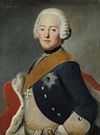Sophia Dorothea of Hanover
| Sophia Dorothea of Hanover | |
|---|---|
 Portrait by Antoine Pesne, 1726 | |
| Queen in Prussia Electress of Brandenburg | |
| Tenure | 25 February 1713 – 31 May 1740 |
| Spouse | Frederick William I of Prussia |
| Issue |
Wilhelmine, Margravine of Brandenburg-Bayreuth Frederick II of Prussia Princess Frederica Louise Philippine Charlotte, Duchess of Brunswick-Lüneburg Sophia Dorothea, Margravine of Brandenburg-Schwedt Louisa Ulrika, Queen of Sweden Prince Augustus William Anna Amalia, Abbess of Quedlinburg Prince Henry Prince Augustus Ferdinand |
| House | House of Hanover |
| Father | George I of Great Britain |
| Mother | Sophia Dorothea of Celle |
| Born |
16 March 1687 Hanover, Principality of Calenberg |
| Died |
28 June 1757 (aged 70) Monbijou Palace, Berlin |
Sophia Dorothea of Hanover (26 March [O.S. 16 March] 1687[1] – 28 June 1757) was a Queen consort in Prussia as wife of Frederick William I. She was the sister of George II of Great Britain and the mother of Frederick II of Prussia.
Biography
Sophia Dorothea was born on 16 March 1687 (O.S.), in Hanover. She was the only daughter of George Louis of Hanover, later King George I of Great Britain, and Sophia Dorothea of Celle. She was detested by her elder brother, King George II of Great Britain.[2]
Crown Princess of Prussia
Sophia Dorothea married her cousin, Crown Prince Frederick William of Prussia, heir apparent to the Prussian throne, on 28 November 1706. They had met as children under the care of their grandmother, Sophia of Hanover, and had disliked each other ever since. Sophia Dorothea differed from her husband in every aspect and the marriage suffered as a result. One of the most important differences between them was that Sophia Dorothea, unlike her husband, loved entertainment.[3] Frederick William contemplated to divorce her the same year they married, and judging by the letters of Sophia Dorothea, he accused her of not wanting to be married to him.[4]
Queen in Prussia
Her husband ascended the throne in 1713 and Sophia Dorothea became queen. She was nicknamed "Olympia" for her regal bearing. The queen and her children were terrorized and beaten by Frederick William, who may have suffered from porphyria.[5][6][7]
Frederick William disliked Sophia Dorothea's early ambition to have Frederick marry Princess Amelia of Great Britain and Wilhelmine marry Frederick Lewis, Prince of Wales. He also accused her of having damaged his relationship to their children, and therefore banned them from seeing her without his presence. This order the children did not respect, but met her in secret, which on at least one occasion caused Frederick and Wilhelmine to have to hide in the furniture in her rooms when Frederick William came to her room unexpectedly when they were there.[8] She had a good relationship with her son, Frederick, later known as "Frederick the Great", who was very attached to her and deeply mourned her death. She spent many days talking to him in the library and was informed of his plans to escape from his father's custody in 1728. After he withdrew from the Prussian court, she corresponded with him from the fortress of Küstrin.
Sophia Dorothea was interested in art, science, literature and fashion. She was not described as a beauty, and she was scarred from smallpox. Nonetheless, she kept an attractive figure in spite of her many pregnancies. She was regarded as proud and ambitious, but her spouse refused to allow her any influence, as it was his belief that women should be kept only for breeding as they would otherwise dominate their husbands. It was the opinion of her daughter Wilhelmine that her father treated her mother unjustly. Frederick William disliked the interests of Sophia Dorothea, which he regarded to be frivolous, such as her interest in theater and gambling, and he also disliked what he regarded to be a life she lived independently from his authority. Her interest in gambling was particularly disliked by him, and it is reported that she and her partners had coffee beans ready on the table during gambling, so that if the king was to appear, they could pretend to be playing about them rather than money.[9] His manner toward her was described as rough, and he is noted to have used uncivil language toward her. His usual bad manners toward her were so noted that the opposite was seen as a surprise. In 1726 Sophia Dorothea inherited a sum of three million from her mother, and Frederick William was noted to suddenly treat her very well. This was regarded to be very unusual, and the Imperial ambassador reported that his changed behavior was merely because he wanted her money. When she never received it, because her brother refused to release the sum, Frederick William resumed his usual manner toward her.[10]
Issue
| Issue | |||||||||||||||||||||||||||||||||||||||||||||||||||||||||||||
|---|---|---|---|---|---|---|---|---|---|---|---|---|---|---|---|---|---|---|---|---|---|---|---|---|---|---|---|---|---|---|---|---|---|---|---|---|---|---|---|---|---|---|---|---|---|---|---|---|---|---|---|---|---|---|---|---|---|---|---|---|---|
|
Ancestors
Notes and sources
- ↑ The Peerage – Sophie Dorothy
- ↑ John David Griffith Davies: A king in toils, L. Drummond, ltd., 1938
- ↑ The Education of the Enlightened Despots
- ↑ Reiners, Ludwig (Swedish): Fredrik den store (Fredrick the Great). Bokindustri Aktiebolag (1956) Stockholm
- ↑ W. F. Reddaway: Frederick the Great and the Rise of Prussia, READ BOOKS, 2008, ISBN 1-4437-2467-X
- ↑ Alexander J. Nemeth: Voltaire's tormented soul: a psychobiographic inquiry, Associated University Presse, 2008, ISBN 0-934223-92-0
- ↑ John David Griffith Davies: A king in toils, L. Drummond, ltd., 1938
- ↑ Reiners, Ludwig (Swedish): Fredrik den store (Fredrick the Great). Bokindustri Aktiebolag (1956) Stockholm
- ↑ Reiners, Ludwig (Swedish): Fredrik den store (Fredrick the Great). Bokindustri Aktiebolag (1956) Stockholm
- ↑ Reiners, Ludwig (Swedish): Fredrik den store (Fredrick the Great). Bokindustri Aktiebolag (1956) Stockholm
- Thea Leitner: Skandal bei Hof, Ueberreuter, 1993, ISBN 3-8000-3492-1
External links
![]() Media related to Sophia Dorothea of Hanover at Wikimedia Commons
Media related to Sophia Dorothea of Hanover at Wikimedia Commons
| Sophia Dorothea of Hanover Born: 26 March 1687 Died: 28 June 1757 | ||
| German royalty | ||
|---|---|---|
| Preceded by Sophia Louise of Mecklenburg-Schwerin |
Queen consort in Prussia 1713-1740 |
Succeeded by Elisabeth Christine of Brunswick-Bevern |
| ||||||||||||||||||||||||||||||||||||||||||||||||||||||||||
| ||||||||||||||||||||||||||||||||||||||||||||||||||||||
| ||||||
| ||||||||||






.png)





